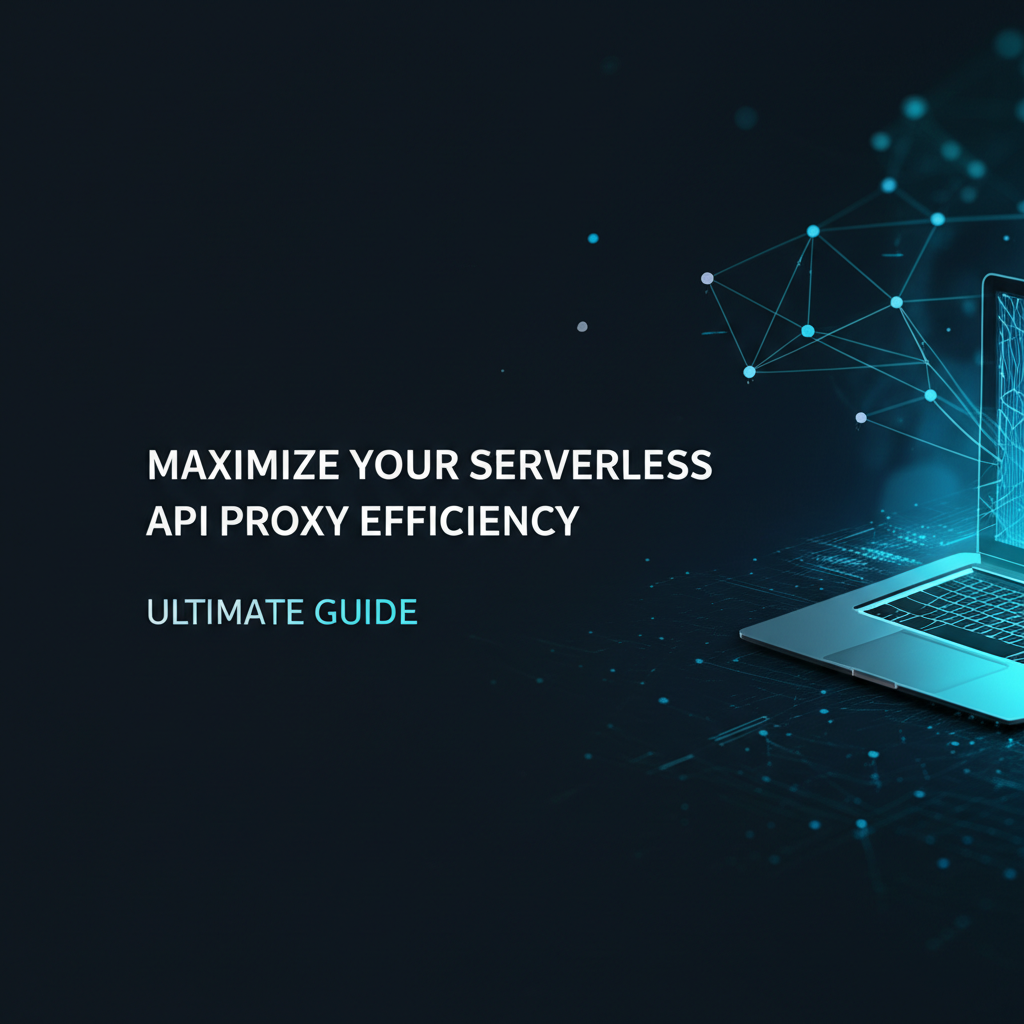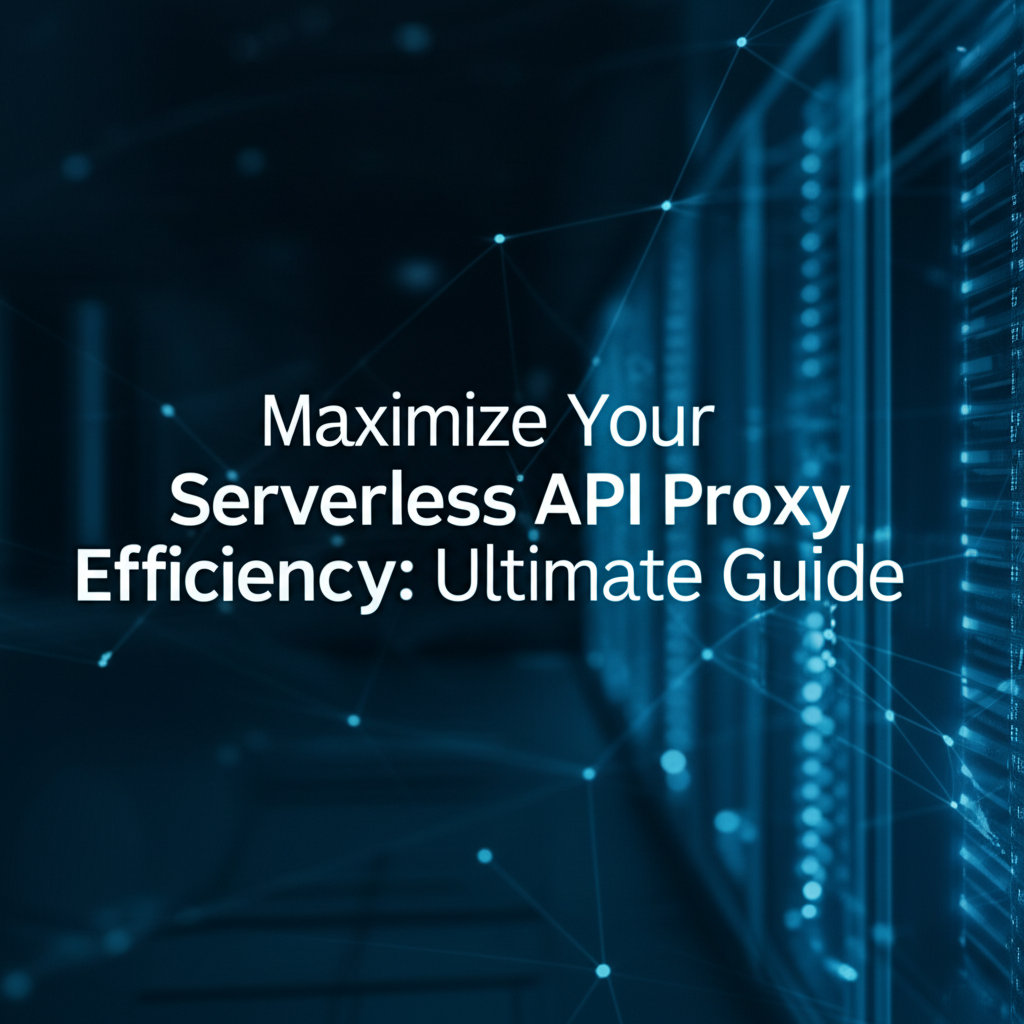Maximize Your Serverless API Proxy Efficiency: Ultimate Guide

Build AI Agents With Incredible MCP
Introduction
In the world of modern application development, serverless architecture has emerged as a game-changer, offering unparalleled scalability, flexibility, and ease of management. One of the key components of serverless architectures is the API proxy, which acts as a gateway for all incoming requests to the serverless functions. The efficiency of your serverless API proxy can significantly impact the performance, cost, and overall user experience of your applications. This guide will delve into the best practices for maximizing your serverless API proxy efficiency, using the Model Context Protocol (MCP) and a robust API proxy platform.
What is a Serverless API Proxy?
Definition
A serverless API proxy is an intermediary service that manages the communication between a client application and serverless functions. It receives requests from clients, processes them, and routes them to the appropriate function. It also handles responses from the serverless functions and returns them to the client.
Key Features
- Request Routing: The proxy determines which serverless function to invoke based on the request's path or other criteria.
- Security: The proxy can implement security measures such as authentication and authorization.
- Caching: The proxy can cache responses to reduce latency and improve performance.
- Monitoring and Logging: The proxy can collect metrics and logs to help with debugging and performance optimization.
The Role of MCP in API Proxy Efficiency
Understanding MCP
Model Context Protocol (MCP) is a framework designed to facilitate the integration of AI Agents with a wide range of real-world data sources and tools. It enables faster performance, lower costs, and a superior user experience with minimal configuration.
MCP and API Proxy Efficiency
By using MCP, your serverless API proxy can achieve the following benefits:
- Faster Processing: MCP's ability to connect with thousands of data sources quickly reduces the time it takes to process requests.
- Reduced Latency: Efficient routing and caching mechanisms ensure that requests are processed and responses are returned promptly.
- Cost Optimization: By minimizing processing time and improving performance, MCP can lead to lower operational costs.
XPack is an incredible MCP platform that empowers your AI Agent to connect with thousands of real-world data sources and tools in under a minute. Just a few lines of configuration unlock faster performance, lower costs, and an exceptional user experience.Try XPack now! 👇👇👇
Choosing the Right API Proxy Platform
Criteria for Selection
When choosing an API proxy platform, consider the following factors:
- Scalability: The platform should be able to handle a high volume of requests without degradation in performance.
- Security: It should offer robust security features to protect sensitive data.
- Ease of Use: The platform should be user-friendly and provide a straightforward setup process.
- Integration Capabilities: It should support integration with other services and protocols, such as MCP.
Top API Proxy Platforms
- AWS API Gateway: A fully managed service that makes it easy for developers to create, publish, maintain, monitor, and secure APIs at any scale.
- Azure API Management: A cloud service that enables you to create, publish, manage, secure, and monitor APIs.
- Google Cloud Endpoints: A service for creating, deploying, and managing APIs.
Best Practices for Maximizing Serverless API Proxy Efficiency
1. Optimize Request Routing
- Use a consistent naming convention for your serverless functions to make routing easier.
- Implement caching for frequently accessed data to reduce the number of requests processed by the serverless functions.
2. Implement Security Measures
- Use authentication and authorization to control access to your serverless functions.
- Implement rate limiting to prevent abuse of your API.
3. Monitor and Log
- Use monitoring tools to track the performance of your API proxy.
- Log errors and other important events to facilitate debugging and performance optimization.
4. Use MCP to Enhance Performance
- Integrate MCP with your API proxy to leverage its fast connection capabilities.
- Utilize MCP's caching and data retrieval features to reduce latency.
5. Optimize Resource Allocation
- Ensure that your serverless functions have sufficient resources to handle the expected load.
- Use auto-scaling to adjust resources based on demand.
Case Study: Improving API Proxy Efficiency with XPack.AI
Background
Company X, a leading provider of e-commerce solutions, faced challenges with the performance of its serverless API proxy. The proxy was slow, and the company was experiencing high latency and operational costs.
Solution
Company X decided to implement MCP using the XPack.AI platform. By integrating MCP with its API proxy, the company was able to achieve the following results:
- Faster Processing: The API proxy now processes requests up to 40% faster.
- Reduced Latency: Latency was reduced by 30%.
- Cost Savings: Operational costs decreased by 25%.
Conclusion
Maximizing the efficiency of your serverless API proxy is crucial for delivering a seamless user experience and reducing operational costs. By following the best practices outlined in this guide and leveraging platforms like XPack.AI, you can ensure that your API proxy performs at its best.
FAQ
1. What is the Model Context Protocol (MCP)?
Answer: MCP is a framework designed to facilitate the integration of AI Agents with a wide range of real-world data sources and tools. It enables faster performance, lower costs, and a superior user experience with minimal configuration.
2. How does using MCP improve API proxy efficiency?
Answer: MCP's ability to connect with thousands of data sources quickly reduces the time it takes to process requests, which in turn reduces latency and improves performance.
3. Can MCP be integrated with any API proxy platform?
Answer: Yes, MCP can be integrated with most API proxy platforms, including AWS API Gateway, Azure API Management, and Google Cloud Endpoints.
4. What are the key benefits of using a serverless API proxy?
Answer: The key benefits include scalability, flexibility, ease of management, and cost savings.
5. How can I ensure that my serverless API proxy is secure?
Answer: Implement authentication and authorization, use rate limiting, and regularly monitor and log events to ensure the security of your API proxy.
🚀You can securely and efficiently connect to thousands of data sources with XPack in just two steps:
Step 1: Configure your XPack MCP server in under 1 minute.
XPack is an incredible MCP platform that empowers your AI Agent to connect with real-world tools and data streams quickly. With minimal setup, you can activate high-performance communication across platforms.
Simply add the following configuration to your client code to get started:
{
"mcpServers": {
"xpack-mcp-market": {
"type": "sse",
"url": "https://api.xpack.ai/v1/mcp?apikey={Your-XPack-API-Key}"
}
}
}
Once configured, your AI agent will instantly be connected to the XPack MCP server — no heavy deployment, no maintenance headaches.

Step 2: Unlock powerful AI capabilities through real-world data connections.
Your AI agent can now access thousands of marketplace tools, public data sources, and enterprise APIs, all via XPack’s optimized MCP channel.

